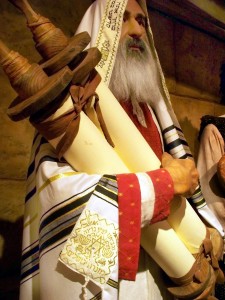 by Fr. Patrick Henry Reardon
by Fr. Patrick Henry Reardon
In Jewish worship, it was customary to address God as “Father.”
Abinu, Malkinu—“Our Father, our King” has always been a standard praise formula in the synagogue. It is not surprising, therefore, that we find this form of address in the teaching of Jesus, even as we find it in His own prayer (Matthew 11:25-26; 26:39, 42; Mark 14:36; Luke 22:42; 23:34, 46; John 11:41; 17:1, 5, 11, 21, 24, 25).
When, in His sermons to the people, Jesus had spoken of God as their Father, the ascription contained nothing to which His adversaries could object. No Pharisee would complain at being told,
“Look at the birds of the air, for they neither sow nor reap nor gather into barns; yet your heavenly Father feeds them” (Matthew 6:26).
Nor would the declaration,
“your heavenly Father knows that you need all these things” (6:32),
give offense to the high priest. The Jewish leadership recognized these convictions as compatible with the teaching of the Torah and the Prophets.
It was quite another matter, however, to hear a Galilean carpenter say, “I am one who bears witness of Myself, and the Father who sent Me bears witness of Me” (John 8:18). How could they endure to hear,
“I do nothing of Myself; but as My Father taught Me, I speak these things”? (8:28).
In those instances in which Jesus speaks to God as Father, the prayer reveals an intimacy with God for which Judaism provides no real parallel. The term expresses the uniqueness of His relationship with the Father. For example,
“I thank You, Father, Lord of heaven and earth, that You have hidden these things from the wise and prudent and revealed them to babes. Even so, Father, for so it seemed good in Your sight. All things have been delivered to Me by My Father, and no one knows who the Son is except the Father, and who the Father is except the Son, and the one to whom the Son wills to reveal Him” (Luke 10:21-22).
All along, Jesus’ enemies had complained of what they saw as His casual attitude toward the Law—especially the Sabbath—but this talk of God as His Father went much further:
“Therefore the Jews sought all the more to kill Him, because He not only broke the Sabbath, but also said that God was His Father, making Himself equal with God” (5:18).
It is important to consider these high assertions of Jesus as reflective of His life of prayer. It was in prayer that Jesus most intensely experienced this intimate communion with His Father. This was the source of His assurance that
“I and the Father are one” (10:30).
Thus, when Jesus spoke of God as “My Father,” the expression was not a metaphorical reference; He was not saying, “God treats me like a father treats his son.” “My Father” was not an external ascription that could be re-phrased into some other intelligible form. The semantic force of “My Father,” from the lips of Jesus, was unique, personal, and utterly literal. “Father” was no figure of speech. The name “Father” expressed, rather, the unique relationship of Jesus to God. This man, Jesus of Nazareth, inwardly knew the Father—by being one with Him—in a way not otherwise available to human beings.
Indeed, no one could know Jesus as He was known by this Father:
“All things have been delivered to Me by My Father, and no one knows the Son except the Father” (Matthew 11:27).
The astounding gift of Jesus to His disciples was the invitation to partake of His own intimacy with the Father. When He proclaimed,
“Nor does anyone know the Father except the Son,”
He went on to add,
“and the one to whom the Son chooses to reveal Him.”
This offer to share His relationship to the Father was the immediate context for Jesus’ summons:
“Come to Me, all you who labor and are heavy laden, and I will give you rest” (11:28).
Matthew’s version of the Lord’s Prayer conveys this relationship with the Father, the relationship that Jesus shares with believers. The “our” of “Our Father” forbids us to separate this prayer from Jesus’ revelation of His Father to believers. To be a “child of God” means to partake of Jesus’ relationship to the Father. Thus, the “our” includes the believer’s union with Jesus in this common prayer to the Father. This was the summons given at the glorification of Jesus, when He spoke of
“My Father and your Father, and My God and your God” (John 20:17).
Patrick Henry Reardon is pastor of All Saints Antiochian Orthodox Church in Chicago, Illinois. He is the author of Christ in the Psalms, Christ in His Saints, and The Trial of Job (all from Conciliar Press). He is a senior editor of Touchstone.
